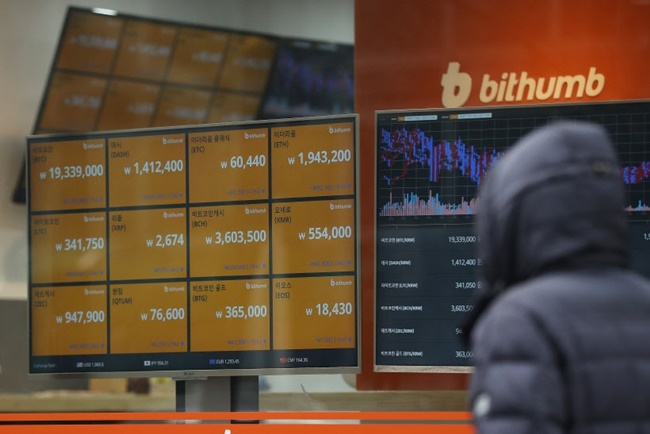As warnings of a bursting bubble and toughening state regulations have led to a drastic downturn of South Korea's digital currency market, local exchanges are struggling over how to remain viable going forward.
Some have moved to diversify their businesses by making the most out of blockchain technology, but a series of incidents that have damaged public trust in the system seems to be holding them back, market watchers said Sunday.
Last week, Bithumb announced the withdrawal of its planned listing of a cryptocurrency, named Popchain, over simmering criticism that the country's No. 2 digital currency exchange has been hastily pushing for its market debut in pursuit of easy profits.
Popchain, which has only been in development for less than three weeks, is worth around $2 million, but more than 90 percent of its supply is known to be stored in two wallets, sparking worries that it may be nothing more than a ponzi scheme.
 |
(Yonhap) |
Some also raised suspicions that the company could try to pocket profits from its listing, as Bithumb officials were known to have been involved in during the development of Popchain.
The news came days after the prosecution sought a court warrant to arrest four officials of cryptocurrency bourses on charges of pocketing billions of won from clients' accounts by transferring the money to their private accounts.
Earlier this month, prosecutors raided the offices of the country's top exchange, Upbit, in Seoul, on suspicion that it has pretended to hold virtual currencies without actual holdings.
"As no investors seem to have been affected by Upbit's alleged business practices, it would not be easy for the authorities to bring any charges to bear," said an expert, requesting anonymity. "But a series of prosecution probes into the exchanges did effectively hurt the overall credibility of the industry."
Continued controversies surrounding digital money exchanges dampened the nascent market, which has been trying to rebound from a drastic fall that came after exponential growth.
Last year, jumping on the bandwagon of the global frenzy, investors here, particularly tech-savvy young people, dove into the cryptocurrency market, hoping to make quick money.
South Korea has become one of the world's most exuberant trading venues. Trading volume surged dramatically to account for more than 20 percent of total global turnover in 2017. At Bithumb, the monthly transaction volume jumped to 56 trillion won ($51.94 billion) in November from 300 million won in January last year.
Despite the jaw-dropping quantitative expansion, the exchanges have gone largely unregulated as digital currencies are not recognized as financial products, and the country has no specific rules to protect virtual currency investors.
After the boom came a bust that highlighted the investment tool's "illegality" features. There were also a series of hacking and leaks of personal info involving major local exchanges, sparking calls for a response from the government.
In line with the global wave of regulations, the South Korean government began to put on the breaks with a series of regulatory measures this year, such as the real-name trading system. Justice Minister Park Sang-ki even said the country was considering a bill to ban cryptocurrency trading altogether.
"Daily trading volume reached around 4 trillion won in January but has tumbled in recent weeks to one-tenth of that," Lee Jeong-ah, vice president of Bithumb, said in a local forum in April, grumbling over the government's "excessively tight" regulations.
The price of a bitcoin hovered over 25 million won per unit in January, but plummeted to 7.19 million won in April, according to market data.
Despite such setbacks, the market has showed signs of bouncing back, as "People tend to buy during dips in a highly volatile high-yield market, and digital currencies seemed to recover into a period of stability," said Park Se-won, an analyst at Hyundai Motor Investment & Securities, pointing to the fact that the average price stayed above 10 million won mark earlier this month.
Facing high market volatility and tough talk from the government, local exchanges are struggling to find a way forward by making most of blockchain technology.
Bithumb has been trying to establish a presence in the payment market. It has inked a deal with several e-commerce firms and online payment systems to push for digital currencies to be used like physical money.
Dunamu, which operates operator Upbit, decided to allocate around 100 billion won over the next three years to vitalize the overall blockchain industry. As part of those efforts, Dunamu joined hands with game maker Neptune to put up 5 billion won each to invest in a blockchain tech-based game firm.
Coinone, one of the country's major exchanges, is looking beyond the boundaries of South Korea. Last month, it established a branch office in Jakarta in the first case of a local exchange seeking to make inroads into overseas markets. The company plans to launch the trading service later this month.
"Along with diversification efforts, priority should be put on ensuring the smooth operation of their trading systems in order to guarantee their growth potential," said Oh Jeong-geun, a professor of IT Finances at Seoul's Konkuk University. "Lack of reliability would cause investors to leave the market forever."
On the day of the prosecution's raid of Upbit, bitcoin skidded more than 10 percent, and has been in the 9 million-won range ever since.
The analyst said it would take time before the digital money market would again gain traction. (Yonhap)





![[Weekender] Korea's traditional sauce culture gains global recognition](http://res.heraldm.com/phpwas/restmb_idxmake.php?idx=644&simg=/content/image/2024/11/21/20241121050153_0.jpg)


